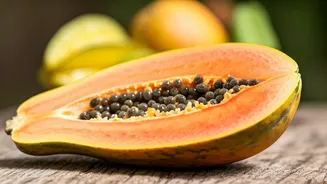Hydrate and Replenish
The first step in recovering from Diwali revelry is to focus on hydration. Alcohol can cause dehydration, leading to headaches and fatigue. Drinking plenty
of water is crucial. Electrolyte-rich beverages such as coconut water can help replenish lost minerals. Furthermore, consider incorporating herbal teas like ginger or chamomile, known for their soothing properties. These teas can also aid in digestion and reduce inflammation. Aim to drink water consistently throughout the day to support your body's natural detoxification processes and speed up recovery. Remember to avoid sugary drinks, which can worsen dehydration.
Gentle Detox Foods
To support your body's natural detoxification processes, focus on incorporating detoxifying foods into your diet. Fruits like citrus fruits, such as lemons and oranges, are rich in Vitamin C and antioxidants, which help neutralize toxins. Green vegetables, including spinach, kale, and broccoli, are packed with vitamins and minerals that promote liver function and overall well-being. Include foods like garlic and onions, known for their sulfur compounds, which support the liver's detoxification pathways. Fiber-rich foods such as oats can also aid digestion and help remove waste from the body. It’s essential to choose whole, unprocessed foods to maximize their benefits and minimize further strain on your system.
Ease Digestive Discomfort
Diwali feasts often lead to digestive upset due to rich and heavy foods. Ginger is a natural remedy, known for its ability to reduce nausea and bloating. Chamomile tea can calm the digestive system and alleviate cramps. Consider incorporating probiotics through yogurt or supplements to restore the gut's healthy bacteria balance. These probiotics will help in digestion. Light, easily digestible foods like plain rice or broth-based soups can give your digestive system a break. Avoiding overly spicy, fried, or fatty foods for a day or two can also help ease digestive discomfort and allow your body to recover more comfortably. Listen to your body and eat slowly and mindfully.
Rest and Sleep
Sleep is crucial for recovery. During sleep, your body repairs and rejuvenates itself. Aim for 7-9 hours of quality sleep. Create a relaxing bedtime routine to improve sleep quality. This can include a warm bath, reading a book, or listening to calming music. Minimize screen time before bed, as the blue light emitted from electronic devices can interfere with sleep. Ensure your bedroom is dark, quiet, and cool. If you are having trouble sleeping, consider herbal supplements like melatonin or valerian root, but consult with a healthcare professional first. Adequate rest will significantly boost your energy levels and overall well-being.
Gentle Exercise Benefits
While you might not feel like it after a night of celebrations, light exercise can significantly aid in recovery. Gentle activities like a short walk or yoga can boost circulation, help your body eliminate toxins, and reduce fatigue. Avoid strenuous workouts, which can put added stress on your body. Listen to your body and don’t push yourself too hard. Even a short walk in fresh air can improve mood and energy levels. If you are not in the mood for exercise, try relaxing exercises like deep breathing. Exercise helps to improve blood flow, which in turn will speed up recovery.
Mindful Eating Habits
After Diwali, it’s essential to be mindful of your eating habits to support recovery and long-term well-being. Focus on balanced meals that include protein, healthy fats, and complex carbohydrates. Avoid processed foods, sugary drinks, and excessive amounts of caffeine. Eat slowly and pay attention to your body's hunger and fullness cues. Practice portion control and avoid overeating. Meal prepping can help you maintain a healthy diet. Plan your meals ahead of time and have healthy snacks readily available to avoid impulse choices. Mindful eating also involves appreciating your food and the effort it took to prepare it. By adopting mindful eating habits, you support your body’s recovery and foster a healthier relationship with food.















